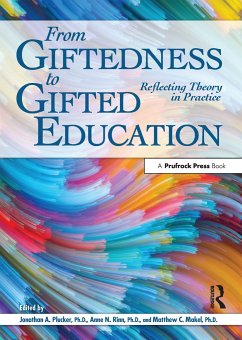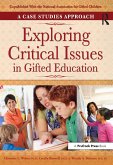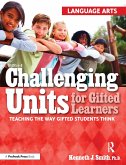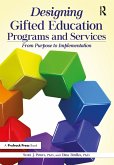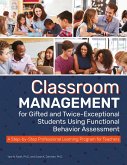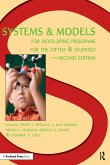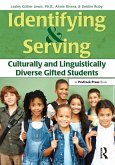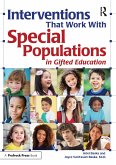From Giftedness to Gifted Education
Reflecting Theory in Practice
Herausgeber: Makel, Matthew C; Plucker, Jonathan A; Rinn, Anne N
From Giftedness to Gifted Education
Reflecting Theory in Practice
Herausgeber: Makel, Matthew C; Plucker, Jonathan A; Rinn, Anne N
- Broschiertes Buch
- Merkliste
- Auf die Merkliste
- Bewerten Bewerten
- Teilen
- Produkt teilen
- Produkterinnerung
- Produkterinnerung
The fields of gifted education and talent development have numerous theories and conceptions for how to identify and serve students. This book helps introduce and apply these ideas to help reflect theory in practice.
Andere Kunden interessierten sich auch für
![Exploring Critical Issues in Gifted Education Exploring Critical Issues in Gifted Education]() Christine L WeberExploring Critical Issues in Gifted Education40,99 €
Christine L WeberExploring Critical Issues in Gifted Education40,99 €![Challenging Units for Gifted Learners Challenging Units for Gifted Learners]() Kenneth J SmithChallenging Units for Gifted Learners26,99 €
Kenneth J SmithChallenging Units for Gifted Learners26,99 €![Designing Gifted Education Programs and Services Designing Gifted Education Programs and Services]() Scott J PetersDesigning Gifted Education Programs and Services49,99 €
Scott J PetersDesigning Gifted Education Programs and Services49,99 €![Classroom Management for Gifted and Twice-Exceptional Students Using Functional Behavior Assessment Classroom Management for Gifted and Twice-Exceptional Students Using Functional Behavior Assessment]() Yara N FarahClassroom Management for Gifted and Twice-Exceptional Students Using Functional Behavior Assessment141,99 €
Yara N FarahClassroom Management for Gifted and Twice-Exceptional Students Using Functional Behavior Assessment141,99 €![Systems and Models for Developing Programs for the Gifted and Talented Systems and Models for Developing Programs for the Gifted and Talented]() Joseph S RenzulliSystems and Models for Developing Programs for the Gifted and Talented85,99 €
Joseph S RenzulliSystems and Models for Developing Programs for the Gifted and Talented85,99 €![Identifying and Serving Culturally and Linguistically Diverse Gifted Students Identifying and Serving Culturally and Linguistically Diverse Gifted Students]() Lesley Collier LewisIdentifying and Serving Culturally and Linguistically Diverse Gifted Students31,99 €
Lesley Collier LewisIdentifying and Serving Culturally and Linguistically Diverse Gifted Students31,99 €![Interventions That Work with Special Populations in Gifted Education Interventions That Work with Special Populations in Gifted Education]() Ariel Sloan BaskaInterventions That Work with Special Populations in Gifted Education48,99 €
Ariel Sloan BaskaInterventions That Work with Special Populations in Gifted Education48,99 €-
-
-
The fields of gifted education and talent development have numerous theories and conceptions for how to identify and serve students. This book helps introduce and apply these ideas to help reflect theory in practice.
Hinweis: Dieser Artikel kann nur an eine deutsche Lieferadresse ausgeliefert werden.
Hinweis: Dieser Artikel kann nur an eine deutsche Lieferadresse ausgeliefert werden.
Produktdetails
- Produktdetails
- Verlag: Taylor & Francis
- Seitenzahl: 382
- Erscheinungstermin: 1. November 2017
- Englisch
- Abmessung: 254mm x 174mm x 25mm
- Gewicht: 673g
- ISBN-13: 9781618217066
- ISBN-10: 1618217062
- Artikelnr.: 47635891
- Herstellerkennzeichnung
- Produktsicherheitsverantwortliche/r
- Europaallee 1
- 36244 Bad Hersfeld
- gpsr@libri.de
- Verlag: Taylor & Francis
- Seitenzahl: 382
- Erscheinungstermin: 1. November 2017
- Englisch
- Abmessung: 254mm x 174mm x 25mm
- Gewicht: 673g
- ISBN-13: 9781618217066
- ISBN-10: 1618217062
- Artikelnr.: 47635891
- Herstellerkennzeichnung
- Produktsicherheitsverantwortliche/r
- Europaallee 1
- 36244 Bad Hersfeld
- gpsr@libri.de
Prof. Jonathan Plucker is the Julian C. Stanley Endowed Professor of Talent Development at Johns Hopkins University, where he works in the School of Education and Center for Talented Youth. Anne N. Rinn, Ph.D. is Professor of Educational Psychology at the University of North Texas, where she also serves as Director of the Office for Giftedness, Talent Development, and Creativity
Introduction Chapter 1: Academic Acceleration: The Theory Applied Chapter
2: Schools Are Places for Talent Development: Promoting Creative Productive
Giftedness Chapter 3: Meeting the Individual Educational Needs of Students
by Applying Talent Search Principles to School Settings Chapter 4: Using
Cluster Grouping to Improve Student Achievement, Equity, and Teacher
Practices Chapter 5: The Autonomous Learner Model: Honoring and Nurturing
the Whole Gifted Child Chapter 6: Athletic Talent Development From Theory
to Practice: The Self-Regulated Talent Development Process Chapter 7: The
Integrative Model of Talent Development (IMTD): From Theory to Educational
Applications by Françoys Gagné Chapter 8: Infusing Culture and Equity in
Gifted Education for Students of Color: Three Frameworks by Donna Y. Ford,
Brian L. Wright, Tarek C. Grantham, and James L. Moore III Chapter 9: Using
the Actiotope Model of Giftedness to Bridge the Gap Between Experiences and
Practice Chapter 10: Smart Contexts for 21st-Century Talent Development:
Sociocultural Approaches to Gifted Education Chapter 11: Transforming
Gifted Education Into Talent Development: Practical Considerations and
Advocacy Advantages Chapter 12: Advanced Academics: A Response to
Intervention Perspective on Gifted Education Chapter 13: Creative Deep
Thinking: Talent Support Networks Fostering the Discovery of Unexpected
Simplicity and the Development of Autonomy, Integrity, and Wisdom Chapter
14: Achievement Orientation Model: Understanding How What We Believe
Determines Whether We Achieve Chapter 15: A Model for Eliminating
Excellence Gaps Chapter 16: The Genetic Side of Giftedness: A
Nature-Nurture Definition and a Fourfold Talent Typology About the Editors
About the Authors
2: Schools Are Places for Talent Development: Promoting Creative Productive
Giftedness Chapter 3: Meeting the Individual Educational Needs of Students
by Applying Talent Search Principles to School Settings Chapter 4: Using
Cluster Grouping to Improve Student Achievement, Equity, and Teacher
Practices Chapter 5: The Autonomous Learner Model: Honoring and Nurturing
the Whole Gifted Child Chapter 6: Athletic Talent Development From Theory
to Practice: The Self-Regulated Talent Development Process Chapter 7: The
Integrative Model of Talent Development (IMTD): From Theory to Educational
Applications by Françoys Gagné Chapter 8: Infusing Culture and Equity in
Gifted Education for Students of Color: Three Frameworks by Donna Y. Ford,
Brian L. Wright, Tarek C. Grantham, and James L. Moore III Chapter 9: Using
the Actiotope Model of Giftedness to Bridge the Gap Between Experiences and
Practice Chapter 10: Smart Contexts for 21st-Century Talent Development:
Sociocultural Approaches to Gifted Education Chapter 11: Transforming
Gifted Education Into Talent Development: Practical Considerations and
Advocacy Advantages Chapter 12: Advanced Academics: A Response to
Intervention Perspective on Gifted Education Chapter 13: Creative Deep
Thinking: Talent Support Networks Fostering the Discovery of Unexpected
Simplicity and the Development of Autonomy, Integrity, and Wisdom Chapter
14: Achievement Orientation Model: Understanding How What We Believe
Determines Whether We Achieve Chapter 15: A Model for Eliminating
Excellence Gaps Chapter 16: The Genetic Side of Giftedness: A
Nature-Nurture Definition and a Fourfold Talent Typology About the Editors
About the Authors
Introduction Chapter 1: Academic Acceleration: The Theory Applied Chapter
2: Schools Are Places for Talent Development: Promoting Creative Productive
Giftedness Chapter 3: Meeting the Individual Educational Needs of Students
by Applying Talent Search Principles to School Settings Chapter 4: Using
Cluster Grouping to Improve Student Achievement, Equity, and Teacher
Practices Chapter 5: The Autonomous Learner Model: Honoring and Nurturing
the Whole Gifted Child Chapter 6: Athletic Talent Development From Theory
to Practice: The Self-Regulated Talent Development Process Chapter 7: The
Integrative Model of Talent Development (IMTD): From Theory to Educational
Applications by Françoys Gagné Chapter 8: Infusing Culture and Equity in
Gifted Education for Students of Color: Three Frameworks by Donna Y. Ford,
Brian L. Wright, Tarek C. Grantham, and James L. Moore III Chapter 9: Using
the Actiotope Model of Giftedness to Bridge the Gap Between Experiences and
Practice Chapter 10: Smart Contexts for 21st-Century Talent Development:
Sociocultural Approaches to Gifted Education Chapter 11: Transforming
Gifted Education Into Talent Development: Practical Considerations and
Advocacy Advantages Chapter 12: Advanced Academics: A Response to
Intervention Perspective on Gifted Education Chapter 13: Creative Deep
Thinking: Talent Support Networks Fostering the Discovery of Unexpected
Simplicity and the Development of Autonomy, Integrity, and Wisdom Chapter
14: Achievement Orientation Model: Understanding How What We Believe
Determines Whether We Achieve Chapter 15: A Model for Eliminating
Excellence Gaps Chapter 16: The Genetic Side of Giftedness: A
Nature-Nurture Definition and a Fourfold Talent Typology About the Editors
About the Authors
2: Schools Are Places for Talent Development: Promoting Creative Productive
Giftedness Chapter 3: Meeting the Individual Educational Needs of Students
by Applying Talent Search Principles to School Settings Chapter 4: Using
Cluster Grouping to Improve Student Achievement, Equity, and Teacher
Practices Chapter 5: The Autonomous Learner Model: Honoring and Nurturing
the Whole Gifted Child Chapter 6: Athletic Talent Development From Theory
to Practice: The Self-Regulated Talent Development Process Chapter 7: The
Integrative Model of Talent Development (IMTD): From Theory to Educational
Applications by Françoys Gagné Chapter 8: Infusing Culture and Equity in
Gifted Education for Students of Color: Three Frameworks by Donna Y. Ford,
Brian L. Wright, Tarek C. Grantham, and James L. Moore III Chapter 9: Using
the Actiotope Model of Giftedness to Bridge the Gap Between Experiences and
Practice Chapter 10: Smart Contexts for 21st-Century Talent Development:
Sociocultural Approaches to Gifted Education Chapter 11: Transforming
Gifted Education Into Talent Development: Practical Considerations and
Advocacy Advantages Chapter 12: Advanced Academics: A Response to
Intervention Perspective on Gifted Education Chapter 13: Creative Deep
Thinking: Talent Support Networks Fostering the Discovery of Unexpected
Simplicity and the Development of Autonomy, Integrity, and Wisdom Chapter
14: Achievement Orientation Model: Understanding How What We Believe
Determines Whether We Achieve Chapter 15: A Model for Eliminating
Excellence Gaps Chapter 16: The Genetic Side of Giftedness: A
Nature-Nurture Definition and a Fourfold Talent Typology About the Editors
About the Authors

